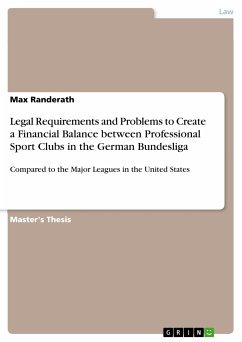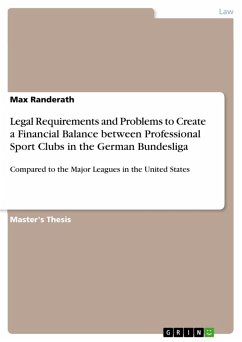Master's Thesis from the year 2012 in the subject Law - Comparative Legal Systems, Comparative Law, grade: A-, Golden Gate University, course: Sports Law, language: English, abstract: There is no question that the most popular sport in the world in terms of participation, viewership and business is soccer. Although soccer gets more popular today in the United States (US), the immense influence of the major sports football (NFL), baseball (MBA), basketball (NBA) and hockey (NHL) makes it almost impossible for soccer to compete in the US. The soccer industry generates revenues running into the tens of billions per year; the Top 20 clubs alone generated around 4,4 billion Euro ($5,37 billion) in the 2010/11 season. Despite increasingly high volumes of revenue, some European soccer clubs are in large amounts of debt. For example, Manchester United, the most valuable soccer club in the world at $1.86 billion, has debts of $756 million as a result of the 2005 takeover by American businessman Malcolm Glazer. To regulate the financial problems the Union of European Football Association (UEFA) invented the Financial Fair Play rules, which basically require that a team does not spend more than it earns. Besides the lack of financial stability there is also a competitive and financial imbalance between the clubs. The major US leagues created devices to prevent competitive and financial imbalance by restricting players, player agents and the clubs through salary caps, revenue sharing or a luxury tax. This thesis will analyze, if the devices are successful and if they would work in Germany and Europe as well. After an overview of the different structures of the leagues, it will be examined if there is competitive and financial balance in the leagues and after an overview of the devices, if the introduction of the devices really creates financial and competitive balance. It will also be reviewed if the rules are legally justified with a particular test of the Financial Fair Play Rules. At the end it will be discussed how the devices can be enhanced.









